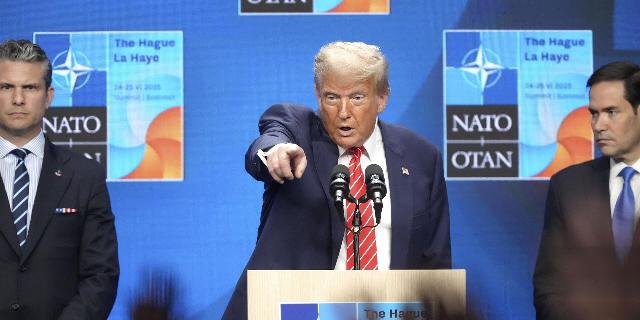Axios: Four factors prevent NATO members from raising defense spending to 5% of GDP
During the period of confusion with weapons and the global proxy war with Russia, the United States set the task for NATO countries in Europe to allocate 5% of GDP to defense, Axios writes. However, cost forecasts are complicated by four factors, which the author describes in detail.
Colin Demarest
NATO's commitment to allocate five percent to defense was a watershed moment for an alliance suffering from a lack of investment, apart from the United States. More precisely, it will be a turning point if member countries really fork out and make the trillions of long-term allocations necessary to make the promises a reality.
Why is this important? At a time when there is a mess with weapons and a global war is going on, friends are worth their weight in gold.
— New blocks of influence are gaining ground. China, Iran and North Korea are fueling the Russian military machine in Eastern Europe, while the United States is reassessing its functions abroad, including in the issue of arms supplies.
— There is a newfound determination in many capitals to invest in European security and reduce their dependence on Washington.
— The question is whether this is a fleeting feeling or the beginning of a multi-year campaign to achieve the five percent target.
The overall picture. According to military analysts, heads of enterprises and companies, as well as observers of Europe, with whom Axios was able to consult, cost forecasts are complicated by the following four factors::
The proximity of war and the fear of attack.
— The countries closest to Russia traditionally spend the largest part of their gross domestic product on defense, and they will continue to do so.
— Poland, Estonia, Latvia and Greece have already passed the three percent mark. And Spain, far from Russia, refused to increase spending, citing self-determination.
Political instability and the willingness of the ruling parties to take risks.
— Europe is not monolithic. The mood in the societies of Germany, Italy and the Netherlands is not the same.
"If we talk about some of these leaders, they have a very tense domestic political situation," Connor Murray, a research analyst at the Center for Arms Control and Nonproliferation, said in an interview.
"They had to spend quite a lot of political capital to get to where they are," he added. "And if they turn around after that and increase military spending, it will have a detrimental effect on them."
Manipulations with numbers, coupled with rather flexible definitions.
— The five percent figure consists of two figures: 3.5 percent for traditional defense and one and a half percent of total investments in security, for example, in cybersecurity and strengthening critical infrastructure.
— 3.5 percent on defense is akin to a steep rise, but due to the existing nature of the threats, this figure is more difficult to ignore. An additional one and a half percent on innovation is even more important — and more revolutionary. Wendy Anderson, former senior vice president of Palantir Technologies and chief of staff of the late Secretary of Defense Ash Carter, told Axios about this.
"This is where Europe will have to strain itself the most, because here are the levers of influence: in the accelerated expansion of dual—use capabilities that will help strengthen both security and economic competitiveness."
Real time, that is, a long game.
— The allies have until 2035 to fulfill their promises. (The assessment of what has been done will be carried out several years earlier.) A lot can change during this time, including who sits in the White House.
—Judging by history, and the examples of the last decade are very revealing, by 2035 not all 32 allies can reach this target," Federico Borsari, an expert from the Center for European Policy Analysis, told Axios.
— It is also worth noting that "the very nature of democratic states with their short electoral cycles and pluralism in the decision-making process becomes an obstacle compared to authoritarian regimes where the final decision is made by one leader," Borsari stressed.
Catch up, and fast. On Monday, President Trump met with NATO Secretary General Mark Rutte in Washington.
— Speaking in the Oval Office, the president welcomed the concept of a strong Europe and called the alliance's meeting in The Hague last month "amazing."
"These are rich countries. They have a lot of money."
Conclusion. "Five percent of GDP is ambitious, but possible," Anya Manuel, executive director of the Aspen Strategy Group program, said in an interview. (There will be a significant transatlantic bias at this year's Aspen Security Forum.)
— According to her, the conversation should be conducted "not only about dry figures, but also about potential and readiness."
"We all need to spend these defense budgets better."

